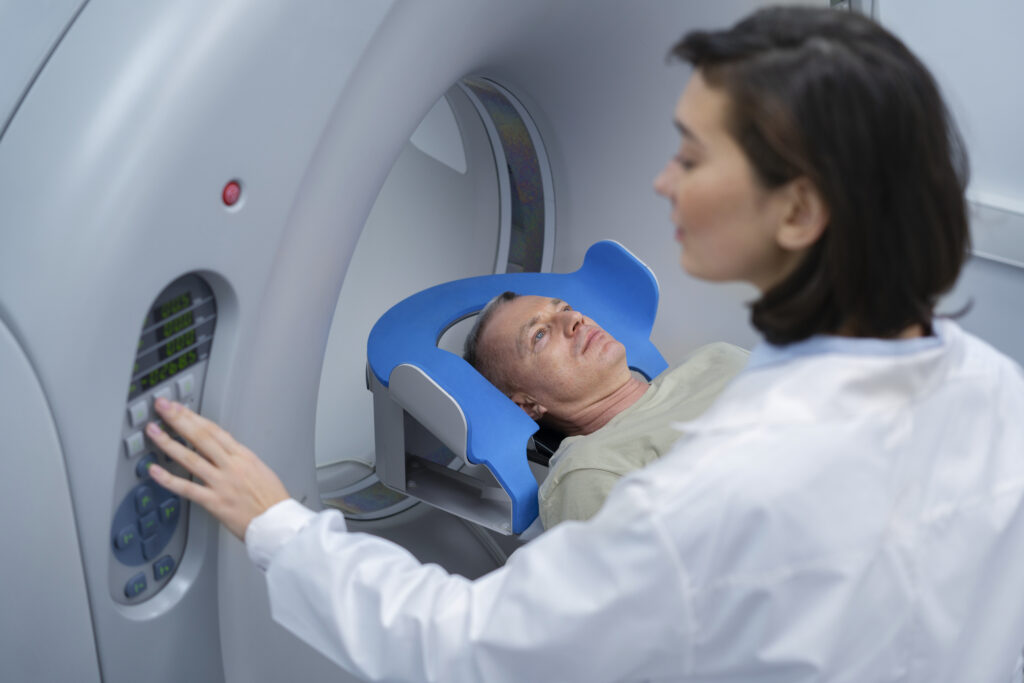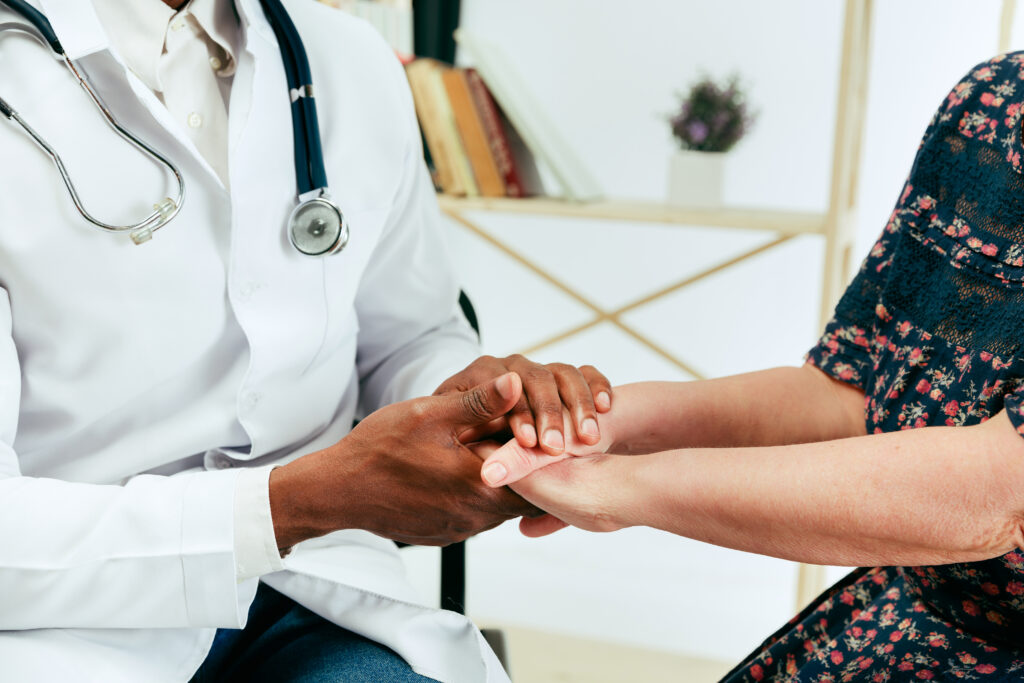Hope in the Fight for Breast Cancer

After having my first baby girl, I was young and didn’t exactly follow what my medical team recommended when it came to breastfeeding. As a result, some of my milk ducts became clogged and painful, and that first bonding experience became more of a chore than a joyful connection. Years later, the same milk ducts became infected and formed a lump that raised concern among my doctors. I eventually had a lumpectomy. Since then—thirty-five years ago—I’ve watched that same breast carefully, performing self-exams and getting annual mammograms. Thirty-five years of wondering, what if this turns malignant one day? kept me on my toes. Back then, a breast cancer diagnosis felt like a life sentence. But today, thanks to decades of tireless research and advances in treatment, the outlook has changed dramatically. We are living in a time of incredible progress and renewed hope. Each year brings breakthroughs that help people not just live longer, but live better, with strength, dignity, and quality of life. Today, over 91% of women are diagnosed with localized breast cancer—meaning the cancer hasn’t spread beyond the breast tissue. This word localized brings hope. It’s a sign of earlier detection and more successful treatments. Survival rates are climbing, thanks to better screening, personalized therapies, and constant, dedicated research. The word chemotherapy can still feel terrifying. But today’s chemotherapy isn’t what it used to be. It’s now often a gentler, more targeted treatment—designed to minimize side effects and preserve quality of life. We also have tools like genomic testing, which helps doctors avoid overtreatment, and immunotherapy, which boosts the body’s natural defenses to fight cancer more effectively. In my community, I see so many people continuing to live their lives with resilience and grace. I’m especially inspired by my students, showing up to yoga class, moving their bodies with purpose as if nothing is happening inside them. They remind me that life can be full and joyful, even during treatment. These newer treatments not only support the body through each step but also help ease the mind. With a stronger focus on mental and emotional well-being, we’re starting to shift our understanding of cancer from a terrifying diagnosis to something more akin to a chronic condition, like autoimmune disease. More people are outliving their prognosis and managing their health with a holistic approach that embraces both the body and the mind. Medical teams are even recommending complementary therapies such as energy healing, massage, yoga, and meditation. While some physicians may not openly talk about it, many incorporate holistic practices into their own lives. Research supports that these practices can enhance medical treatment by helping patients reconnect with themselves, mind, body, and spirit. With continued hope and new clinical trials on the horizon, the future looks brighter. I will keep monitoring my health, staying proactive with screenings, and doing my best to live a balanced, wholesome lifestyle—not just for myself, but for my loved ones too. If you’re in the middle of this journey, please know you are not alone. We’re all walking alongside you, fighting with you, hoping with you. Our collective wish is that one day soon, breast cancer becomes a manageable chronic condition—and no longer something to fear. Lean on your support system, whether it’s your family, your friends, or your care team. The cure is closer than ever. Letting go of fear entirely might not be possible, but knowing there’s a global community—scientists, doctors, survivors, and supporters—working around the clock to find a cure might shine just enough light to get you through today. Nameste, Shab
The Tough Decisions Caregivers Face

After coming to terms with my father’s cognitive decline, my brother and I were confronted with a harsh reality: home was no longer a sustainable option. The house that had been a place of comfort and memories was now a source of stress, risk, and growing uncertainty. As much as we wanted to hold on, we knew that waiting too long to make a change could leave us with fewer and less desirable options for his care. One of the biggest concerns we faced was the need to transition him into an Assisted Living facility before his cognitive state declined further. Many Assisted Living facilities have requirements—if a resident’s cognitive impairment progresses beyond a certain point, they may be moved to Memory Care. While Memory Care provides necessary supervision, it often comes with more restrictions, less independence, and a very different living environment. We wanted our father to have as much autonomy and dignity as possible for as long as possible, and that meant making a move sooner rather than later. Selling his home was one of the most difficult and emotional steps in this process. This was the house where we grew up, where birthdays were celebrated, where countless memories were made. Sorting through his belongings felt like peeling back layers of our family history, each item a reminder of the life he had built. The logistics of preparing the house for sale—coordinating with real estate agents, dealing with legal paperwork, and handling the emotional weight of it all—was overwhelming. Through it all, my brother and I leaned on each other. There were moments of frustration, disagreements over the best approach, and nights filled with exhaustion. But we both knew that at the heart of every decision was our father’s well-being. We had to put aside our emotions and focus on what was best for him. The process of searching for an Assisted Living facility was another daunting task. We toured multiple places, each with its own set of strengths and weaknesses. We had endless questions—how involved was the staff? What was the community like? Would our father feel at home? It was a delicate balance between finding a place that met his needs while also feeling like a place he could comfortably transition into. There were no easy answers in this journey. Every choice felt like a compromise, a trade-off between what we wished could be and what reality demanded. But as difficult as these decisions were, we knew we had to make them with courage and urgency. In the next post, I’ll take you through the search for the right Assisted Living facility—the questions we asked, the challenges we faced, and the moment we knew we had found the right place for our father to call home.
A Radiation Therapist’s Perspective

As a former Radiation Therapist, I was a witness to countless patients and their journeys through cancer treatment. I often wondered about the profound changes the psyche endures. Cancer enters our lives uninvited—sometimes creeping in silently, other times crashing in like a storm. It affects not only the body but shakes our very foundation. Emotions swirl, and the world looks different in the blink of an eye. Fear and anxiety rise to the surface, isolation feels like the safest refuge, and self-sabotage emerges as a coping mechanism. Fear is often the first reaction when receiving a diagnosis. The mind races, filling in the blanks with worst-case scenarios. Questions come up: What does this mean? How will this change my life? Will I survive? Will I lose my hair? What about my family? At its core, fear is the mind’s way of trying to protect us, yet more often, it amplifies suffering. Anxiety follows closely behind, trapping thoughts in an uncertain future. Anxiety does not understand the concept of now. And so, a new cycle begins—this becomes the new normal. I remember listening to my patients as they tried to make sense of their illnesses. Many sought answers—Was this a punishment from God? Did my lifestyle contribute to this? Is this a lesson? What have I done wrong? What choices led me here? While I could see their fear and anxiety, I also sensed an unspoken urgency—to slow down, to acknowledge life as it was unfolding. Take it one day at a time. Feel life. I observed an evolution when self-compassion emerged. Patients became gentler with the changes their bodies were undergoing. Instead of resenting their symptoms and pain, they worked alongside them. The need to control every aspect of their medical situation softened, trust took over, and the process seemed to flow more smoothly—guiding them from one phase to the next. When I had the privilege of treating a close friend and former colleague, I witnessed a drastic shift in the psyche. She walked in for her daily treatments, barely saying a word. The weight of her withdrawal was palpable. A former healthcare professional, now facing the same challenge she had once helped others navigate. In her mind, no one truly understood what she was going through. Her ego was crushed. Not even the colleagues she once trusted could save her. Life around her continued as usual, while hers had come to a halt. She felt isolated. Isolation became her shield—a way to preserve energy when everything else was falling apart. I gently tried to bridge the gap, not just as her therapist but as a friend. I reminded her that the support surrounding her was not judgment but a safety net—a place to lean on without guilt. But in those moments, I don’t think she heard a word I said. Sometimes, all it takes is one person—a single presence offering true understanding—to help ease the burden of fear and anxiety. I know from personal experience that illness can feel incredibly lonely, but the presence of a loved one or a friend brings immense comfort. Reaching out requires courage and patience on both sides. Family and friends should not be discouraged, nor should the patient walk this unbearable path alone. In reaching out, we remember that we are not alone—that we are capable of loving and of being loved, if only we crack the door open to let the light in. While isolation often felt like a prison for my patients, self-sabotage was the guard at the door. When illness disrupts life, this response can emerge unexpectedly. I recall one patient confiding in me about his refusal to follow his doctor’s recommendations. “What has my body ever done for me? Look how it’s repaid me for all my good behavior,” he mocked. He had decided to neglect his health entirely, convinced he was undeserving of healing. He pushed his family away, believing they would only remind him of his illness and deepen his pain. I had seen this rebellion before. For some, it feels easier to lean into despair than to hold onto hope. After all, if you expect nothing, you cannot be disappointed. Especially when the future feels uncertain. As a Radiation Therapist, I made it my mission to be fully present for my patients. Even in their darkest moments, I dealt with patterns of self-sabotage with kindness rather than judgment. I created a safe space where true healing could happen despite their unwillingness to cooperate. I have witnessed the incredible strength of the human spirit. Not only did my patients endure, but they also transformed. They healed—sometimes in ways beyond the physical. Every breath became a reminder that life continued, even when it felt like it was slipping away. Cancer undoubtedly alters the course of one’s life, but it does not define who we are or who we will become. Beneath fear, anxiety, isolation, and self-sabotage, there is strength, wisdom, and an unbreakable connection to something greater than us. My patients are never truly alone. They remain in my heart and my thoughts—always. The psyche may change, but the essence of who they are remains unshaken. Namaste, Shab.
Nurturing Your Digestive Health: An Eastern Approach to Strengthening Your Immune System

Digestive problems, including bloating, are on the rise. Social media is filled with notifications about them, and medications to soothe the system are constantly advertised. But why are we experiencing more bloating, upset stomachs, and digestive issues? We are consuming more food than we should, and we’re also eating at a faster pace due to the demands of our modern life. When was the last time you took a moment to chew your food slowly, ate without distractions, or focused solely on your meal without multitasking? Most of us eat while planning our day or our next move. We might chat with family members or friends, discussing current events or issues. How often have you seen someone sitting under a tree, quietly sipping a cup of tea or coffee? Or take a lunch break to sit in nature, eating without checking the phone? Our stomach is like a friend: we’re with it but not truly present. We don’t listen to her needs. We either overeat or neglect to nourish her properly. We feed her, thinking that’s enough for her health, but she requires our attention and care. When she shows signs of discomfort, we ignore her. Instead of listening, we reach for medications or over-the-counter quick fixes to keep her quiet. She stays by our side, patiently waiting for the next meal while we rush through life, giving her little time to feel appreciated. We continue to pour our stress and emotions onto her, and she silently holds onto our burdens. Over time, her capacity to handle it all shrinks, and she struggles more. As a loyal companion, she never abandons us, but she will continue showing signs of unease, discomfort, and even pain. If we don’t address these signals, she might not function as well as she once did. We don’t just feed her with food. We feed her with everything we take in from the outside world. The current climate, political issues, and even personal struggles can all have an impact on her. While she is digesting the food we consume, she is also dealing with the mental strain we put her under. She absorbs both physical and emotional stress. When stress is short-term, she can recover and return to her natural state. However, if stress becomes chronic and we can’t release it, she will suffer alongside us. As a result, her physical symptoms may worsen, and her mental state could deteriorate. Over time, if we ignore these signs, illness may develop. Remember, illness doesn’t occur overnight. Serious diagnoses often come after silent or vocal signs have been ignored for a long time. Now that she is weak, we must take time to pay attention to her. Why didn’t we listen to her earlier? Why didn’t we avoid overeating? Why do we consume so much processed food and alcohol? Why don’t we eat simply at least 75% of the time? Why do we have so many cold drinks? These questions may arise when we receive a diagnosis. But the most important question is: Why not start today? By embracing simple Eastern philosophies like Ayurveda, Chinese medicine, and the teachings of figures like Avicenna, we can bring peace and balance to our digestive system. If you’re ready to care for your friend (your stomach), here are some Ayurvedic tips: Avoid drinking ice-cold water before meals: Cold drinks can shut down your digestive fire, known as Agni. This makes it harder for your body to digest food properly. Think of it like pouring cold water on a hot grill before cooking—your food won’t cook properly! Eat in a peaceful environment: Avoid distractions like TV or your phone. Emotions can interfere with digestion, so give your body the peaceful space it needs to process food. Eat wholesome, natural, and cooked foods: Focus on foods that nourish and support your digestion. Drink plenty of water, preferably warm or hot: Warm water helps detox the body and supports the digestive process. Take your time to eat: Savor the taste of your food. When you focus on eating mindfully, your stomach feels more satisfied, and you’re less likely to overeat. Change starts with a single step: the desire to feel better and nurture a healthier digestive system. A healthy stomach is the foundation of a strong immune system, and a strong immune system is the key to a happy, well-functioning body. Nameste Shab
Understanding the Process and Benefits of Radiation Therapy

Last week, we discussed the importance of building trust with your radiation therapist and how it creates a supportive foundation for your treatment journey. Equally important is understanding the educational role your therapist plays in helping you navigate the complexities of radiation therapy. This week, we’ll explore how your radiation therapist ensures you’re well-informed about the process, empowering you to take an active role in your care. Demystifying the Radiation Therapy Process Radiation therapy is a highly specialized form of treatment, and it’s natural to feel uncertain about what it involves. Your radiation therapist is there to guide you through each step, ensuring that you have a clear understanding of the procedure. From the initial simulation session, where the treatment area is mapped out, to the precise delivery of radiation, your therapist will explain what’s happening and why it’s necessary. For example, your therapist might discuss how advanced imaging technologies are used to pinpoint the exact location of cancer cells, minimizing exposure to surrounding healthy tissue. They’ll also explain the role of immobilization devices, such as molds or masks, which help you maintain the same position during each session for optimal accuracy. This transparent communication helps build trust and makes the treatment process less intimidating. By knowing what to expect, you can approach each session with greater confidence and ease. Understanding the Benefits of Radiation Therapy Radiation therapy is a powerful tool in the fight against cancer. Your radiation therapist will help you understand how it works to target and destroy cancer cells. Unlike chemotherapy, which affects the entire body, radiation therapy focuses on a specific area, delivering high doses of radiation to shrink tumors or eliminate cancerous cells. Your therapist will also explain how radiation therapy fits into your overall treatment plan. For many breast cancer patients, radiation is used after surgery to reduce the risk of recurrence by targeting any remaining cancer cells in the breast, chest wall, or nearby lymph nodes. It may also be combined with chemotherapy or hormonal therapy to improve outcomes. Hearing these benefits directly from your therapist can ease concerns and reinforce the importance of completing your prescribed treatment plan. It’s a reminder that every session is a step toward recovery. Preparing for and Managing Side Effects Another key aspect of your radiation therapist’s role is educating you on what to expect during and after treatment. They’ll discuss common side effects, such as fatigue, skin irritation, or changes in breast texture, and guide how to manage them. For example, they might suggest specific skincare routines to minimize irritation or recommend strategies for conserving energy during treatment. Your therapist will also inform you about potential long-term effects, so you’re aware of what to monitor in the future. They’ll advise you on when to reach out to your medical team if you notice any unusual symptoms, ensuring that any complications are addressed promptly. Empowering You Through Knowledge By equipping you with information, your radiation therapist empowers you to take an active role in your treatment. This knowledge not only reduces fear but also fosters a sense of partnership between you and your care team. Understanding the “why” behind each step helps you feel more in control of your journey, making the experience more manageable. Your therapist will encourage you to ask questions and share concerns throughout the process. Whether you’re curious about how the equipment works or worried about potential side effects, they’re there to provide answers and reassurance. This open dialogue creates a collaborative atmosphere, where your voice is valued as part of your care team. Looking Ahead As we continue to explore the multifaceted role of your radiation therapist, next week we’ll focus on the emotional support they provide. Beyond their technical expertise, radiation therapists are compassionate listeners who can help you navigate the emotional challenges of treatment. Their presence and empathy are invaluable, ensuring you feel supported every step of the way.
The Mirror Talks Back

What we do every day counts! How many times have you heard this phrase? I’ve seen and heard it countless times, but I never truly understood its essence. It’s essentially telling us that our daily routine sets the foundation for how our body and mind respond. From the personal hygiene rituals in the morning to the bedtime prep, every cell in our body is listening and reacting. The mind that we often refer to and point to in our heads actually exists in every cell of our body. When we look at ourselves in the mirror and experience negative thoughts, our liver cells, stomach cells, and every part of us are listening too. What we tell ourselves doesn’t just circulate in our heads but travels throughout our body, just like blood circulation. After cancer treatments and multiple procedures, I could only see what I had lost: a breast, a limb, my hair, my eyebrows, my clear skin, and my once beautiful body shape. Body image after cancer is not an easy subject to address or navigate alone. During chemo, I gained twenty-five pounds and had a hard time even recognizing myself. Who was that person in the mirror? The facial hair I used to complain about was now gone, and I missed it. My once slim and attractive figure now resembled the Pillsbury Doughboy. The flexible joints that made me look like a ballerina were now stiff and achy, reluctant to move. Going through cancer treatment isn’t for the faint of heart; I get that now. But what does that say about me? It tells me I’m resilient. I’m still here, fighting, taking life one day at a time, and moving forward. If I look back too much, I might shatter. It’s hard to believe what I’ve endured. If someone had told me that weekly chemo and endless blood tests would become my norm, I’d have wanted to give up before even starting. But what I didn’t realize was just how much I wanted to live. I want to see my children grow up, witness their successes, and live a healthier life myself. Not that I was unhealthy before, but there’s always room for improvement. Maybe I can adjust my thinking, declutter my home to create space to breathe or react to life with more calmness. These are small changes, but they can make a big difference. It’s hard to motivate myself to move after what my body has been through. Asking it to get up and walk daily feels like asking the impossible. If my body could talk, it would probably say, “Are you kidding me? You want me to do what now?” I get it. It’s easier to stay on the couch and binge-watch Netflix. It’s easier to avoid cleaning the kitchen or taking a shower. But as tempting as it is to stay in that comfort zone, I know I still have today—and today is an opportunity. So, I get up slowly and savor my morning drink. I take a quick shower, enjoying the massage I’m giving my tired skin. When the sun is out, I put on my walking shoes and hat, grab my walker, and head outside for a stroll. The fresh air and changing seasons remind me of life’s constant evolution. If the trees can let go of their leaves and wait for new ones, why can’t I embrace change too? My curly hair may not return, but maybe I can experiment with straight hair. My slim figure might not be back yet, but my walks might help me shed some pounds and regain strength. My missing breast will always be a loss, but there are ways to feel semi-normal on the surface. How I feel within, however, will take time to heal. I’ve decided to focus on small improvements. Progress isn’t always linear; sometimes, it’s two steps forward and one step back. But that’s okay. My goal is to live each day with better habits and a more positive mindset. One thing I’m certain of is that blaming my body or myself for my cancer isn’t the way to go. Instead, I’m replacing negative and fearful thoughts with encouraging words before they spread through my body. My daily routine matters more than ever, and what I do every day counts tremendously in shaping my health and happiness. So, what are you waiting for? Ask yourself: what change could make the most difference in your life right now? Start small, and let each step lead you closer to healing and hope. Namaste, Shab
The Radiation Therapist’s Role in Patient Support

Last week, we discussed the benefits of mindfulness techniques for managing stress and emotions during treatment. This week, we’ll focus on an equally vital aspect of your care: the role of your radiation therapist in building trust and creating a supportive environment throughout your treatment journey. Radiation therapists are integral members of your healthcare team. From your first session to your last, they are there to ensure your treatment is delivered safely, accurately, and effectively. However, their role extends far beyond the technical aspects of treatment. They play a crucial part in making you feel comfortable, heard, and cared for during what can be an emotionally and physically challenging time. The Importance of Building Trust Building trust with your radiation therapist is essential for a positive treatment experience. Trust allows you to feel confident in their expertise, helping to alleviate anxiety and enabling open communication. When you trust your therapist, you’re more likely to share concerns or discomforts, which can lead to adjustments that improve your overall comfort and care. According to the American Society for Radiation Oncology (ASTRO), effective communication is a cornerstone of building this trust. A compassionate therapist will take the time to explain each step of the treatment process, from positioning on the treatment table to the specific goals of the radiation therapy. They will also encourage you to ask questions, no matter how small, and address your fears with patience and empathy. Emotional Support During Treatment Radiation therapy can feel intimidating, especially during the early sessions. Your therapist is there to provide reassurance and emotional support, helping you navigate these feelings. They understand that each patient’s journey is unique and strive to create an environment where you feel safe and cared for. For example, if you’re feeling anxious before a session, your therapist might guide you through relaxation exercises or use calming language to help ease your nerves. These seemingly small gestures can make a significant difference in your overall experience, transforming a potentially stressful situation into one that feels manageable and even empowering. Practical Support and Comfort Radiation therapy often involves multiple sessions over several weeks, making physical comfort a priority. Your therapist is responsible for ensuring you’re positioned correctly on the treatment table, but they’ll also take steps to make you as comfortable as possible. If you experience discomfort, such as pain or difficulty holding a specific position, your therapist can make adjustments or suggest strategies to improve your comfort. In addition, your therapist is a valuable resource for managing side effects. Whether it’s offering advice on skincare for radiation-treated areas or suggesting ways to reduce fatigue, they are there to provide practical guidance that supports your well-being. Creating a Collaborative Relationship The relationship between you and your radiation therapist is a partnership. By being open about your concerns and asking questions, you allow your therapist to better meet your needs. In turn, their attentiveness and dedication help foster a sense of collaboration and mutual respect. This partnership not only enhances your treatment experience but also contributes to better outcomes by ensuring your care is tailored to your unique circumstances. Building a Supportive Environment Your therapist understands that the treatment process can be overwhelming, and they are committed to creating a supportive environment. This might involve providing a consistent routine that helps reduce uncertainty, offering encouraging words, or simply listening when you need to talk. Their presence can be a source of stability and comfort during a time of change and challenge. Next week, we’ll explore another important aspect of your therapist’s role: educating you about the radiation therapy process. Understanding how radiation therapy works and the benefits it provides can help you feel more empowered and engaged in your treatment journey.
Healthcare Interactions Impact Patient Safety

I’ve been researching, teaching, and writing about the importance of communication skills and emotional intelligence for over 20 years. This is roughly the same amount of time that The Joint Commission has been tracking catastrophic mistakes we make which are known as Sentinel Events. They track and publish a detailed report on the types and causes of these tragic events including the most recent 2023 Annual Report. What is most striking is how communication is and has been one of if not the leading root cause year after year! And root causes of Sentinel Events that show up consistently in the data include teamwork, leadership, and human factors. We can appreciate how the quality of interactions influences our ability to provide safe care by examining two examples. Image by Gerd Altmann from Pixabay A nurse overhears a colleague gossiping about her and interrupts: “I’d appreciate it if you have concerns about my work that you discuss them with me directly and professionally.” The gossiping nurse apologizes and later offers to help the nurse. The help enabled the nurse to get pain medication to her post-op patient quickly and the patient felt cared for. Patient experience scores increase. A doctor yells at a nurse on Tuesday. Saturday night the nurse hesitates to call her about a subtle change in a patient’s condition. Since it’s close to the end of the shift, she tells the oncoming nurse. This nurse makes it a priority to check the patient, but the telemetry alarm beats him to it. The patient does not survive. These examples show how the quality of simple interactions influences critical outcomes like patient safety and patient experience. Like the ‘Butterfly Effect, in both these situations, the outcomes are obvious, yet the roots involving the quality of interactions are elusive. Combining this train of thought with the data suggests that our solutions to date are not getting at the underlying issues aimed to improve these root causes. Reducing the incidence of sentinel events will require us to dive deeper into the social and emotional learning that influences individual, team, and organizational behavior. This includes understanding the need for professionals to develop skills and competencies that influence the quality of our interactions. These include; self-awareness, confidence, adaptability, flexibility, perspective-taking, and the ability to give and receive constructive feedback, set limits, respect others’ limits, ask for help, and delegate tasks. Developing these skills is no small task as people have different levels of growing edges, resources such as time and money are limited, experiential learning opportunities are essential, and effective teaching methods are limited. The good news is that Medical Improv can be used to teach all of these skills and competencies while reducing stress and promoting positive relationships and cultures. More about that in future posts. For now, the important take-home is that the quality of healthcare interactions matters!
Hope in Healing – Inspiring Stories of Resilience During Treatment

Last week, we explored the vital role of family dynamics in supporting both you and your loved ones throughout your cancer treatment journey. This week, we’ll focus on an equally powerful aspect of recovery: hope. Sharing stories of resilience and triumph from individuals who have faced the challenges of breast cancer can inspire and motivate you as you navigate your own path. Hope is more than just wishful thinking—it’s a driving force in the healing process. It uplifts your spirits, fuels determination on tough days, and reminds you that you’re not alone. Stories of others who have endured similar struggles provide a source of strength and perspective, demonstrating that even in the darkest moments, resilience and growth are possible. Consider the story of Maria, who faced multiple rounds of radiation therapy and chemotherapy. Despite the physical and emotional toll of treatment, Maria chose to focus on maintaining a sense of normalcy. She continued to work, care for her children, and even volunteer in her community. Maria’s story is a testament to the strength that emerges when we embrace life’s challenges with courage and purpose. Another inspiring figure is Janice, who was diagnosed with advanced-stage breast cancer. Instead of retreating, she found a renewed sense of purpose by becoming an advocate for cancer awareness. Through her efforts, she educated others about the importance of early detection and offered support to newly diagnosed patients. Janice’s determination to make a difference not only helped her cope with her diagnosis but also created a lasting impact on her community. These stories highlight a common theme: while cancer treatment is undeniably challenging, it can also be a journey of personal growth and connection. Many survivors report discovering inner strengths they never knew they had, building deeper relationships with loved ones, and gaining a greater appreciation for life’s simple joys. Drawing hope from others’ experiences doesn’t mean ignoring the difficulties of your own journey. Instead, it’s about finding inspiration to keep moving forward. Whether it’s through a personal connection, a memoir, or a local support group, hearing how others have persevered can bolster your own resilience and remind you of the possibilities that lie ahead. For some, hope is also found in small, everyday victories. Completing a treatment session, feeling well enough to enjoy a favorite meal, or receiving good news from your medical team are moments worth celebrating. Recognizing and appreciating these milestones can reinforce your determination and keep your spirits high. Remember, hope doesn’t have to come from grand gestures or monumental achievements. It often lives in the quieter moments: a kind word from a friend, the laughter of a loved one, or the comfort of knowing you’re supported by your healthcare team. Next week, we’ll explore mindfulness techniques as another way to navigate the emotional challenges of treatment. These tools can help you manage stress, maintain a positive mindset, and find balance during this demanding time. Hope, coupled with mindfulness, can create a powerful foundation for emotional and physical resilience.
Family Dynamics – How Families Can Support You and Themselves


